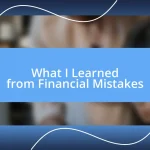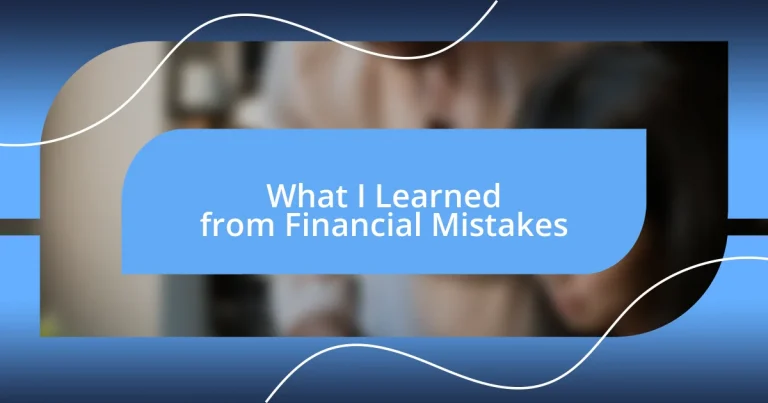Key takeaways:
- Understanding financial mistakes can lead to personal growth, prompting better budgeting and planning habits.
- Avoiding common financial pitfalls, such as neglecting savings and impulsive spending, can prevent significant monetary setbacks.
- Transforming mistakes into learning experiences fosters resilience and inspires proactive financial strategies for a secure future.
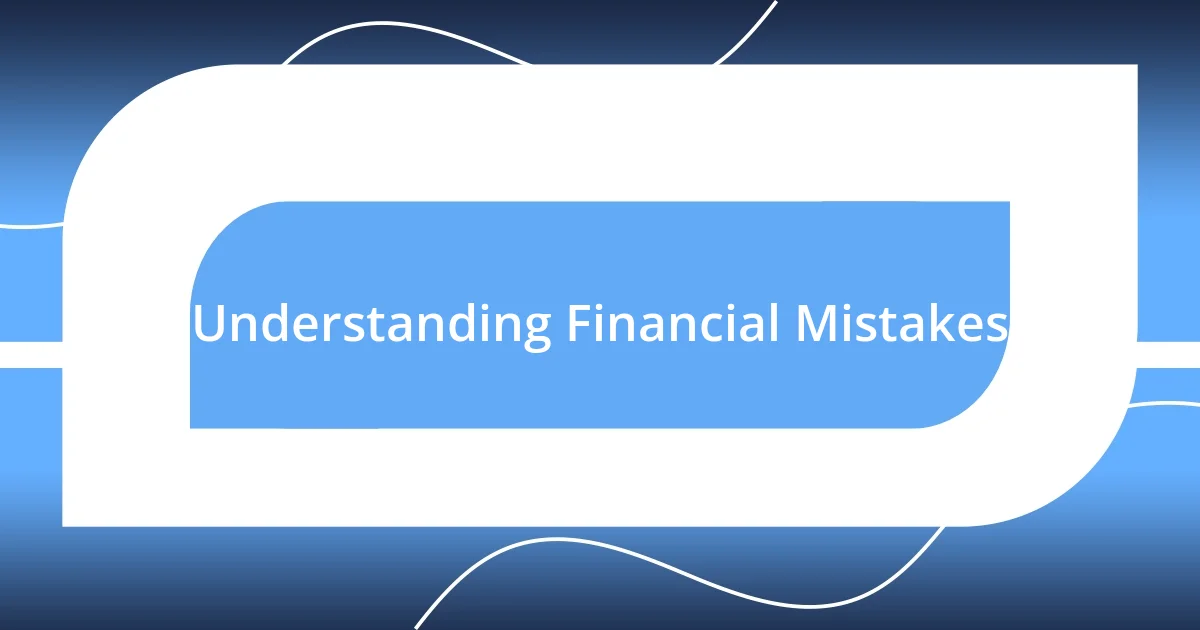
Understanding Financial Mistakes
Understanding financial mistakes is a crucial step in personal finance growth. I remember my first investment in a stock that I barely researched. I thought, “How could I lose?” Well, I lost a significant chunk of my savings because I failed to understand the market’s volatility. This taught me that ignorance can be costly.
Often, the emotional toll of financial mistakes can overshadow the monetary loss. I felt a wave of shame wash over me after racking up unnecessary debt on credit cards due to impulse purchases. Have you ever faced a similar situation? It’s tough to admit but recognizing these moments can lead to valuable lessons about spending habits and self-control.
Reflecting on these experiences, I realize that mistakes can serve as powerful teachers. Each slip-up pushed me to seek knowledge and develop a proactive approach to budgeting. I wasn’t just learning how to avoid pitfalls; I was crafting a more secure financial future for myself. Isn’t it interesting how our stumbles can ultimately lead us on the path to success?
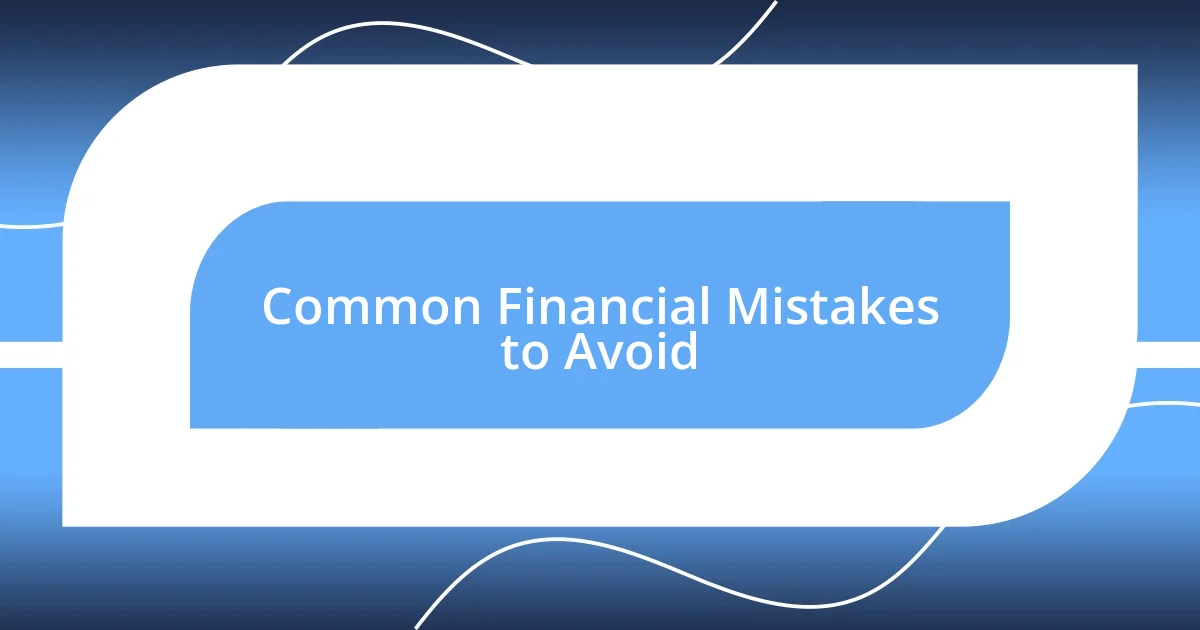
Common Financial Mistakes to Avoid
We often think we have time to make financial mistakes without facing consequences, but a few common missteps can truly set us back. For instance, I once neglected to build an emergency fund, convinced that my steady paycheck was enough to weather any storm. When an unexpected expense popped up, I found myself scrambling to cover it, leading to a stressful cycle of debt that took months to escape.
Here are some common financial mistakes to steer clear of:
- Ignoring Budgeting: Skipping this fundamental step can lead to overspending.
- Racking Up Credit Card Debt: It’s easy to swipe now and think later, but the interest adds up quickly.
- Procrastinating on Savings: Waiting to save can result in missed opportunities for compounding interest.
- Neglecting Retirement Accounts: Not investing early could mean sacrificing comfort in your later years.
- Failing to Research Before Investing: Shopping blindly for investments can lead to costly errors, much like my own experience with that stock.
Avoiding these pitfalls isn’t just about numbers; it’s about paving a smoother road for your future self.
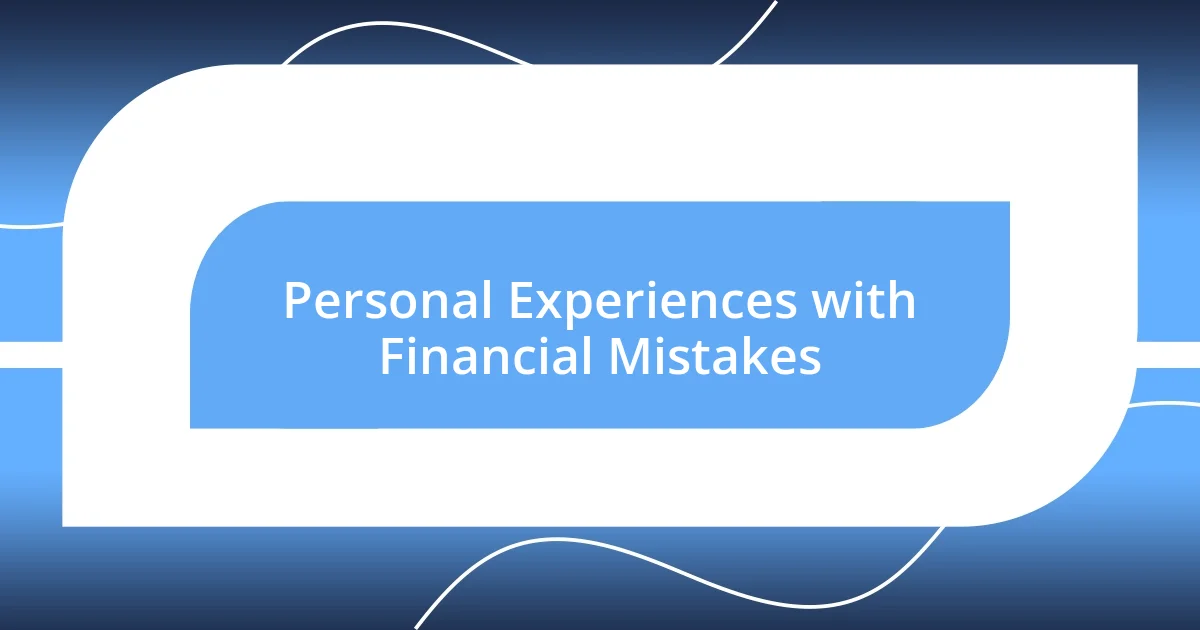
Personal Experiences with Financial Mistakes
The moment I decided to take out a loan for a new car, I felt a mix of excitement and dread. I was in a place where my income was stable, but my lack of foresight about the total cost led me into a financial hole. After factoring in the interest and unexpected maintenance costs, I realized that what seemed like a dream turned into a monthly burden, forcing me to forgo other enjoyable activities, like dining out or traveling.
One memory that stands out involves a time I impulsively signed up for a luxury subscription service. I kept telling myself it was just a small fee. However, watching my bank account dwindle month after month made me feel trapped, like I was shackled to a needless expense. This recurring charge acted like a wake-up call, sparking my journey towards more mindful spending and greater financial discipline.
Learning from these experiences is paramount. Reflecting on my financial choices has enabled me to better assess risks and recognize the long-term impact of seemingly minor decisions. It’s fascinating how each financial slip not only shaped my finances but also crafted a stronger, better-equipped version of myself.
| Financial Mistake | Lesson Learned |
|---|---|
| Car Loan with High Interest | Always calculate the total cost, including interest and unforeseen expenses. |
| Impulse Subscription | Monitor recurring charges and practice mindful spending habits. |
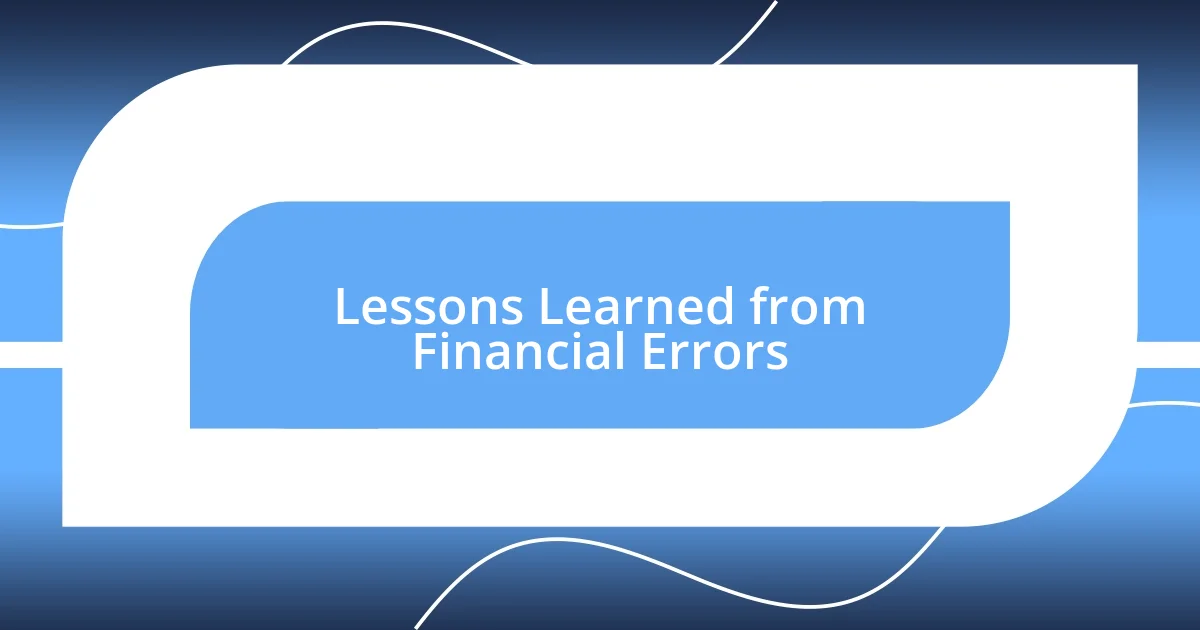
Lessons Learned from Financial Errors
Reflecting on my journey, one striking lesson emerged: the importance of patience when it comes to investments. I remember jumping into a hot investment trend without doing my homework, driven by the fear of missing out. That decision wasn’t just about lost money; it was the unease of knowing I had ignored my better judgment, which left me with regret that lingered far longer than the financial loss itself.
Another key lesson revolves around the concept of living within my means. There was a time when I equated luxury with happiness, convincing myself that an extravagant lifestyle was a reward I deserved. When my bank balance told a different story, I felt the weight of that choice—like carrying a backpack full of stones. This experience taught me that true satisfaction comes from appreciating what I have, rather than chasing after what I think I want.
Finally, there’s the powerful impact of seeking advice. Early in my financial journey, I tried to navigate my way alone, only to stumble often. But one day, after a particularly crushing setback, I reached out to a financial mentor. Their guidance didn’t just lighten my burden; it opened my eyes to new strategies and perspectives, helping me realize that asking for help doesn’t signify weakness. Instead, it fosters growth, pushing me to build a foundation for a more secure financial future.
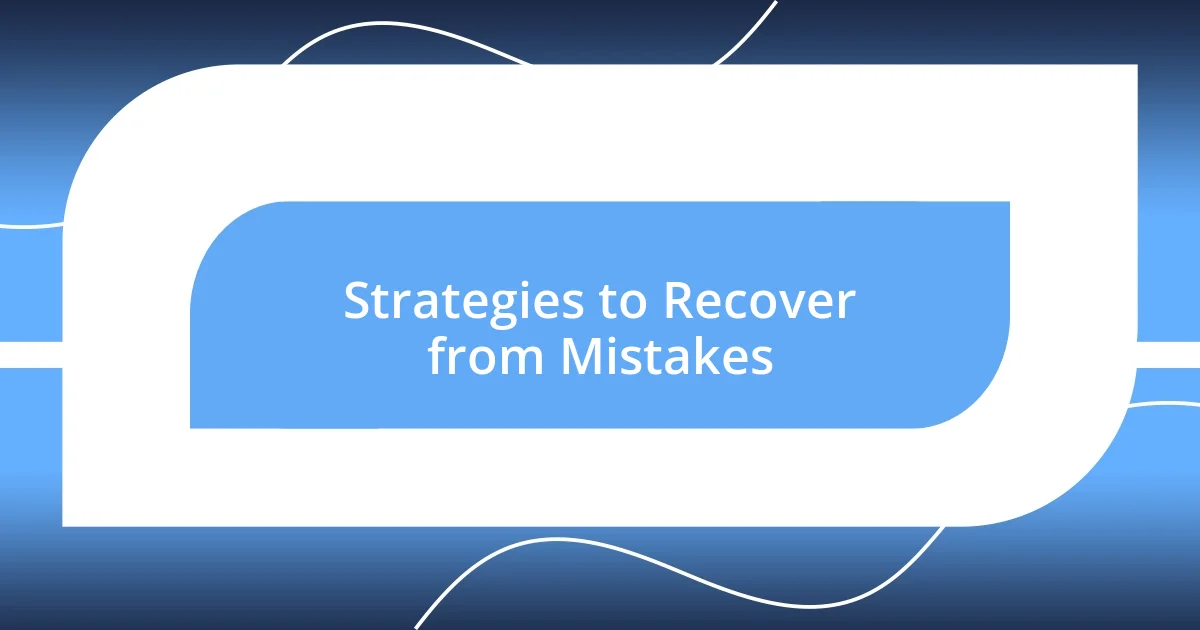
Strategies to Recover from Mistakes
When it comes to recovering from financial mistakes, the first strategy I found effective is to create a comprehensive budget. I remember sitting down with a piece of paper, feeling a bit overwhelmed at first, but as I listed my income and expenses, I could see exactly where my money was going. This clarity not only helped in prioritizing essential payments but also opened up opportunities to cut back on non-essentials. Have you ever had that kind of revelation when tracking your spending? It’s enlightening.
Another approach that significantly boosted my recovery was setting up a dedicated savings fund. After realizing how quickly expenses add up, I decided to set aside a portion of my paycheck every month specifically for unexpected costs. This acted as my financial cushion, reducing the anxiety that comes with uncertainties. I can’t stress enough how vital it is to have that buffer; it’s like a safety net for your finances, wouldn’t you agree?
Lastly, I’ve learned the value of ongoing financial education. Initially, I felt intimidated by concepts like investing or interest rates, but diving into books and podcasts opened my eyes to a world of knowledge. Reflecting on my mistakes often leads me to seek more information, and this continuous learning has empowered me to make better choices. It’s fantastic—don’t you find? Every time I learn something new, I feel more in control of my financial future, ready to navigate it with confidence.
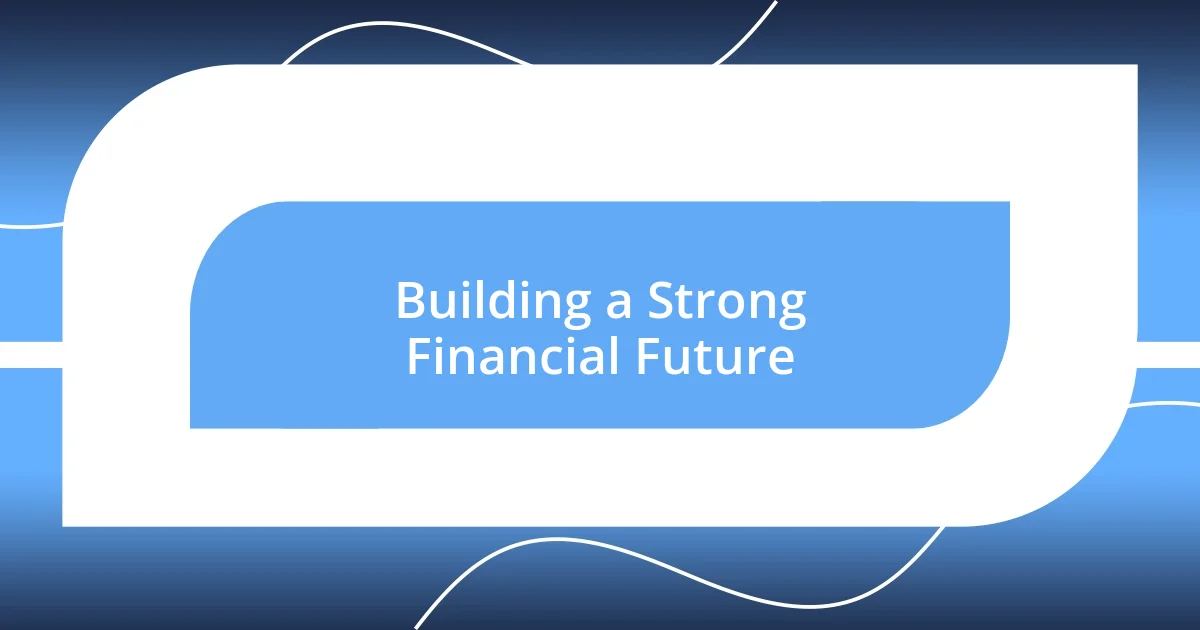
Building a Strong Financial Future
Building a strong financial future often requires a shift in mindset. I remember a time when I viewed money merely as a means to enjoy the latest trends and experiences. A turning point came when I realized that saving for experiences, like traveling, could bring me more joy than short-lived indulgences. Have you ever felt that satisfaction from planning something meaningful rather than splurging on a fleeting moment? It’s profound.
Setting clear goals now anchors my financial decisions. In the past, I would casually spend without much thought, but creating a vision for my future ignited a desire to save. I vividly recall the day I mapped out my dream of owning a home. That vision made every dollar I saved feel purposeful and motivated me to stay disciplined, even during tempting moments. I can’t help but wonder—what dreams are you allowing your financial choices to support?
Lastly, I’ve learned the importance of diversifying my income streams. A few years back, I had all my eggs in one basket, relying solely on my primary job. When an unexpected layoff occurred, it was a rude awakening. Diversifying through side gigs and investments has not only increased my financial security but has opened doors to new passions. Have you considered how multiple income sources could enhance your stability? It’s a game-changer, enabling a more resilient financial future.
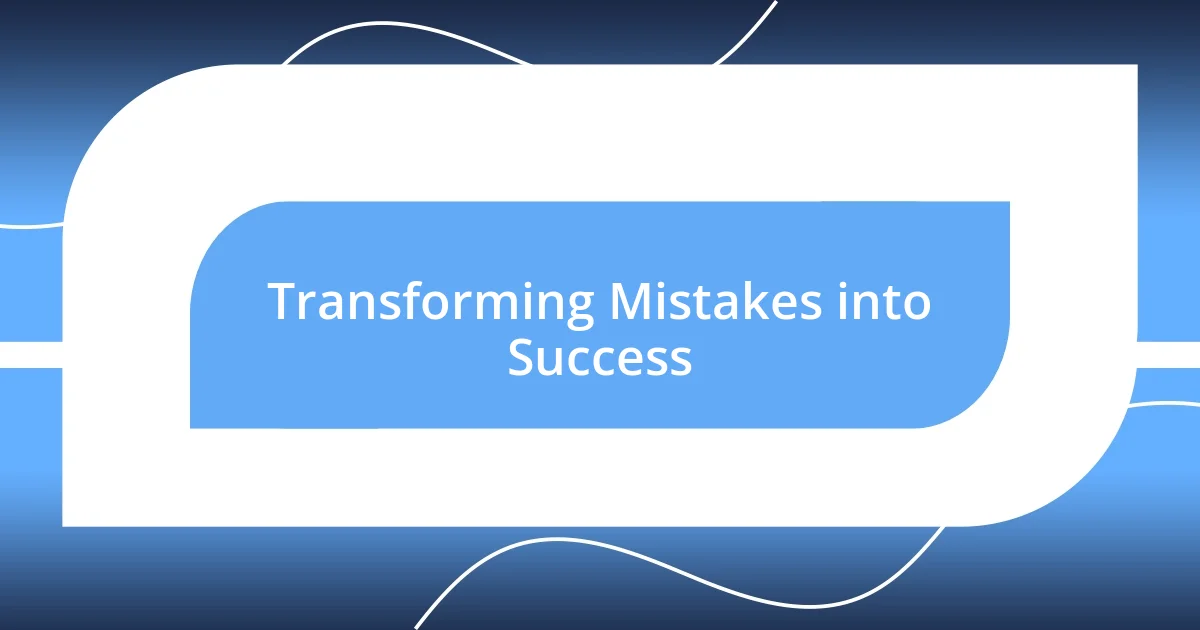
Transforming Mistakes into Success
Transforming mistakes into success is often about reframing our failures as valuable lessons. I can still recall the sting of an impulsive investment I made without doing my homework. After watching that money dwindle, I learned to take my time and research thoroughly before diving in. How many times have you rushed into a decision only to regret it later? With each error, I took a moment to reflect, turning that moment of regret into a stepping stone for better choices.
Moreover, sharing my experiences with others has turned my mistakes into a source of inspiration. One evening, while chatting with a friend about my early financial missteps, I noticed how engrossed they were in my story. Seeing how my journey encouraged them to rethink their financial habits struck a chord in me. It made me realize that our vulnerabilities can be powerful catalysts for change, don’t you think? I began to take pride in my past errors, knowing they could help someone else avoid the same pitfalls.
Lastly, embracing adaptability has been crucial in my journey. There was a phase when I stubbornly clung to a budget that just wasn’t working for me. Once I allowed myself to adapt and tweak my approach, everything changed. I found new ways to allocate funds and discovered hidden opportunities for saving. Isn’t it liberating to let go of rigid plans when they no longer serve us? That flexibility not only minimized my losses but ultimately guided me toward a more fulfilling financial path, paving the way for future success.






